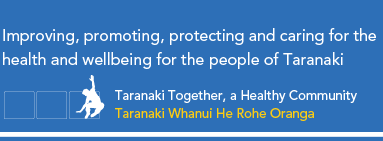Rest home gastroenteritis outbreaks in Taranaki
04 April 2014
Outbreaks of a highly infectious tummy bug have been identified in five Taranaki rest homes and an estimated 100 people have been diagnosed with suspected viral gastroenteritis.
The features of the illness are those of norovirus infection (predominantly vomiting and diarrhoea).
Results from one rest home have so far confirmed norovirus. The DHB expects to receive laboratory results from other rest homes in the next few days.
Taranaki DHB’s Medical Officer of Health Dr Jonathan Jarman says norovirus is a highly infectious disease and it is easily transmitted from one person to another.
“Outbreaks of suspected norovirus gastroenteritis are not uncommon in rest homes and hospitals due to the close living conditions of residents and patients.”
Dr Jarman said that he strongly suspected that the rest home outbreaks were because of a high level of gastroenteritis that is presently being reported in the community.
Since March 17, five Taranaki rest homes have notified the Medical Officer of Health about outbreaks of suspected norovirus gastroenteritis.
“Norovirus is highly infectious and sometimes being in the same room where someone has vomited is enough to catch the illness. We have been working with the rest homes, whose staff, residents and visitors are required to follow strict infection control measures to reduce the risk to others.”
Dr Jarman asked family members to have patience if they could not visit a relative in a rest home because of the outbreak.
“Affected rest homes will be putting up signs and will be asking non-essential visitors to stay away.”
Norovirus gastroenteritis is normally only a mild to moderate illness but the elderly and the very young can have more serious disease.
Symptoms include vomiting, diarrhoea, stomach pains and feeling like throwing up.
People with symptoms of gastroenteritis are advised to stay away from other people and see a doctor if the symptoms are severe or the illness does not get better after two days.
“The most effective way you can protect yourself and your family against norovirus is to wash your hands regularly, using plenty of soap, cleaning under the fingernails, rinsing your hands and thoroughly drying them on a clean towel.
About Norovirus
- Norovirus is a very common cause of gastroenteritis in the community.
- The most usual ways of catching it are contact with infected people, eating contaminated food (especially shellfish) or drinking untreated water.
- Symptoms are predominantly vomiting and diarrhoea, stomach pains, aching muscles, feeling off-colour and a headache which usually last approximately 48 hours.
- Those with symptoms should remain at home until at least 48 hours symptom free and avoid preparing food for others. In a family setting it is important for those with symptoms to avoid contact with the elderly and the young.
- f symptoms are severe or prolonged, dehydration may occur. The illness is usually self-limiting but may be worse in the young and the elderly. Those severely affected should consult a doctor.
- The most important way of preventing spread is thorough hand hygiene (washing hands for 20 seconds using soap and running water and drying for 20 seconds) after going to the toilet and before preparing food.
Dr Jonathan Jarman
Medical Officer of Health
For further information please call
Sue Carrington
Media Adviser
Ph 021 367 789
Last updated: Friday, April 4, 2014


